Unit 3 rouble! grammar 课件(共21张PPT) 牛津上海版(试用本)八年级英语上册
文档属性
| 名称 | Unit 3 rouble! grammar 课件(共21张PPT) 牛津上海版(试用本)八年级英语上册 |
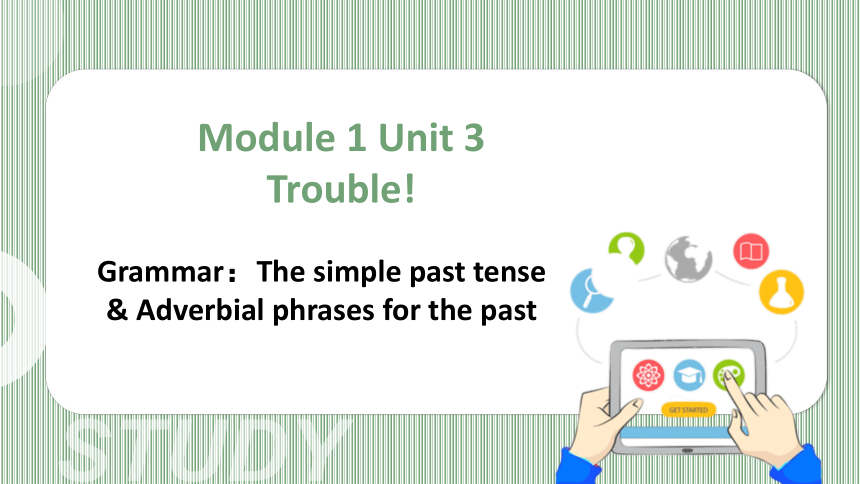
|
|
| 格式 | pptx | ||
| 文件大小 | 980.6KB | ||
| 资源类型 | 教案 | ||
| 版本资源 | 牛津上海版(试用本) | ||
| 科目 | 英语 | ||
| 更新时间 | 2024-01-02 00:00:00 | ||
图片预览

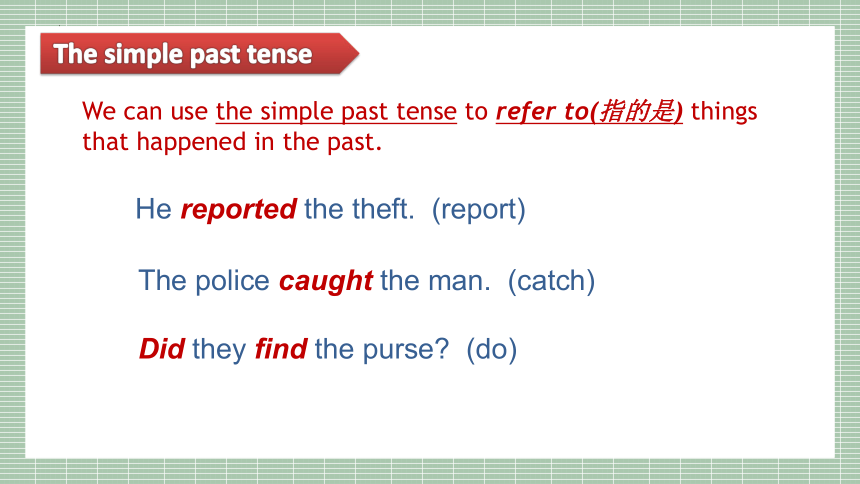
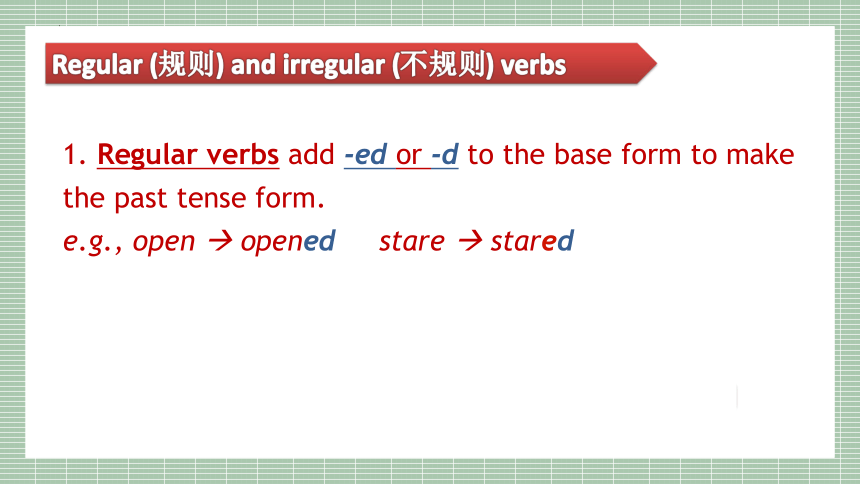
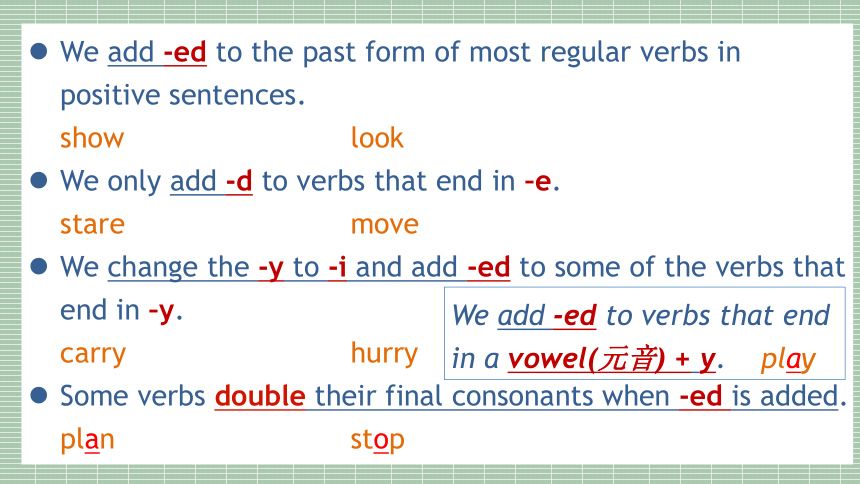
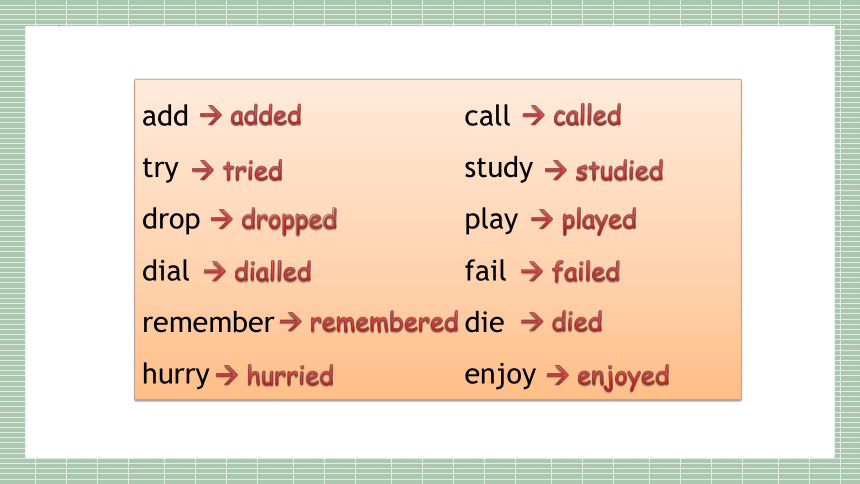
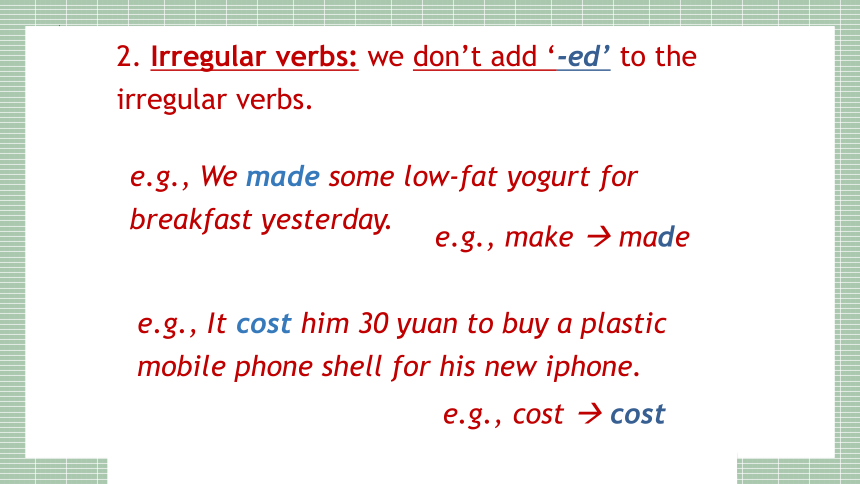
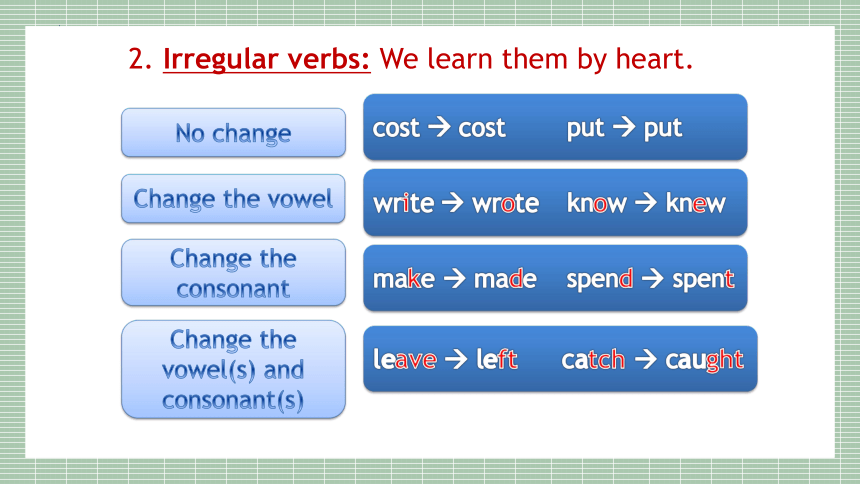
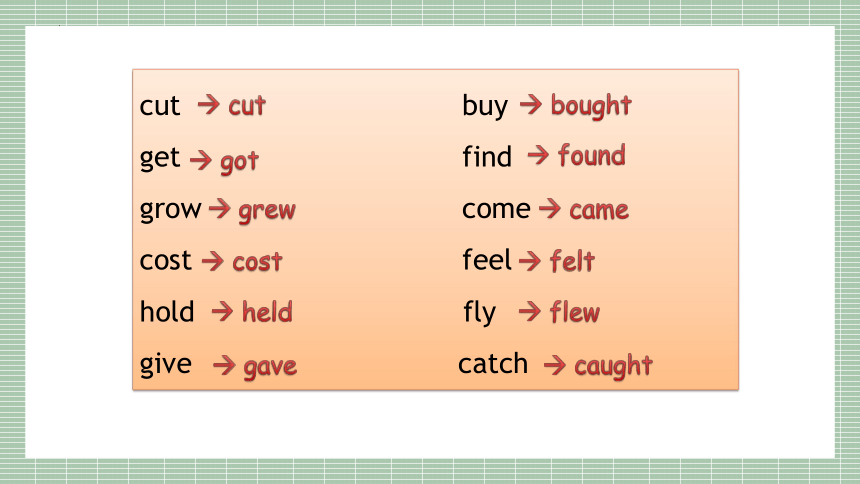
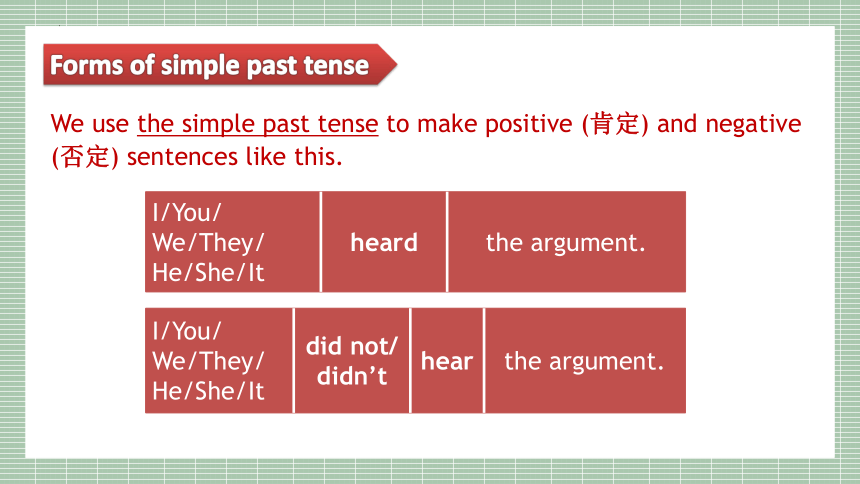
文档简介
(共21张PPT)
Module 1 Unit 3
Trouble!
STUDY
Grammar:The simple past tense
& Adverbial phrases for the past
The simple past tense
We can use the simple past tense to refer to(指的是) things that happened in the past.
He reported the theft. (report)
The police caught the man. (catch)
Did they find the purse (do)
1
2
3
4
5
Regular (规则) and irregular (不规则) verbs
1. Regular verbs add -ed or -d to the base form to make the past tense form.
e.g., open opened stare stared
We add -ed to the past form of most regular verbs in positive sentences.
show look
We only add -d to verbs that end in –e.
stare move
We change the -y to -i and add -ed to some of the verbs that end in –y.
carry hurry
Some verbs double their final consonants when -ed is added.
plan stop
We add -ed to verbs that end in a vowel(元音) + y. play
add call
try study
drop play
dial fail
remember die
hurry enjoy
added
called
tried
studied
dropped
played
dialled
failed
remembered
died
hurried
enjoyed
1
2
3
4
5
2. Irregular verbs: we don’t add ‘-ed’ to the irregular verbs.
e.g., We made some low-fat yogurt for breakfast yesterday.
e.g., make made
e.g., It cost him 30 yuan to buy a plastic mobile phone shell for his new iphone.
e.g., cost cost
No change
Change the vowel
Change the consonant
cost cost put put
write wrote know knew
make made spend spent
leave left catch caught
2. Irregular verbs: We learn them by heart.
Change the vowel(s) and consonant(s)
cut buy
get find
grow come
cost feel
hold fly
give catch
cut
bought
got
found
grew
came
cost
felt
held
flew
gave
caught
Forms of simple past tense
We use the simple past tense to make positive (肯定) and negative (否定) sentences like this.
I/You/
We/They/
He/She/It heard the argument.
I/You/
We/They/
He/She/It did not/ didn’t hear the argument.
We can use the simple past tense to ask and answer questions like this.
Did I/You/
We/They/
He/She/It hear the argument
Yes, I/You/
We/They/
He/She/It did.
No, didn’t.
1
2
Two months ago Last Tuesday I played basketball.
I had violin lessons a week ago.
last night.
Adverbial phrases for the past
We can use the adverbial phrases of time with the simple past tense to show when something happened.
We went shopping yesterday.
last Sunday.
at one o’clock.
in November.
Last month, On Saturday, In 2005, Ten days ago, we went to Beijing.
Adverbial phrases can go after or before the main clause.
Using last
Where did you go last week
Did you have a good time last night
I went to the cinema with Jack last Monday.
The word last refers to the week, month, year, etc. before the present one.
We don’t say ‘last morning/afternoon/evening’, but ‘yesterday morning/afternoon/evening’.
Tips
Using in, on or at with time
We use in, on or at with time phrases.
in
We bought the flat in 1994.
on
The football match was on Monday.
at
The film started at seven thirty.
in + year / month / season
Using in with time
in 1998
in September
in winter
in the 21st century
in + a week or longer times
in the Christmas holiday
in the spring term
in + part of a day
in the morning
in the evening
1
2
on + a day in a week / date;
Using on with time
on Wednesday
on 15 April
on that day
on + a day
on Easter Monday
on Christmas Day
on the Dragon Boat Festival
on + a day + part of a day;
on Friday morning
on Tuesday evening
on + part of a day + date
on the morning of 12 May
on the afternoon of 1 June
3
4
5
6
at + clock time
Using at with time
at three o’clock
at half past four
at + a certain time
at that time
at the moment
at noon/night/midnight
at + meal time
at lunch (-time)
at break
at + two or three days
at Christmas/Spring Festival
at the weekend
1
2
I woke up in the night.
Here are some examples with ‘night’:
(= at midnight)
It happened on Monday night.
I couldn’t sleep at night.
3
4
5
6
every
We do not use in, on or at before these words:
We go to Hong Kong every summer.
last
next
this
tomorrow
yesterday
My brother came home last Christmas.
I’ll see you next Friday.
I leave school this year.
The party is tomorrow evening.
The group set off yesterday morning.
Using ago
The word ago refers to a period of time before now. It always comes after the time word(s).
I passed my driving test six months ago.
Vicky wrote to the company weeks ago.
David first met Melanie a long time ago.
—Have you see Emma
—Yes, just a few minutes ago.
Module 1 Unit 3
Trouble!
STUDY
Grammar:The simple past tense
& Adverbial phrases for the past
The simple past tense
We can use the simple past tense to refer to(指的是) things that happened in the past.
He reported the theft. (report)
The police caught the man. (catch)
Did they find the purse (do)
1
2
3
4
5
Regular (规则) and irregular (不规则) verbs
1. Regular verbs add -ed or -d to the base form to make the past tense form.
e.g., open opened stare stared
We add -ed to the past form of most regular verbs in positive sentences.
show look
We only add -d to verbs that end in –e.
stare move
We change the -y to -i and add -ed to some of the verbs that end in –y.
carry hurry
Some verbs double their final consonants when -ed is added.
plan stop
We add -ed to verbs that end in a vowel(元音) + y. play
add call
try study
drop play
dial fail
remember die
hurry enjoy
added
called
tried
studied
dropped
played
dialled
failed
remembered
died
hurried
enjoyed
1
2
3
4
5
2. Irregular verbs: we don’t add ‘-ed’ to the irregular verbs.
e.g., We made some low-fat yogurt for breakfast yesterday.
e.g., make made
e.g., It cost him 30 yuan to buy a plastic mobile phone shell for his new iphone.
e.g., cost cost
No change
Change the vowel
Change the consonant
cost cost put put
write wrote know knew
make made spend spent
leave left catch caught
2. Irregular verbs: We learn them by heart.
Change the vowel(s) and consonant(s)
cut buy
get find
grow come
cost feel
hold fly
give catch
cut
bought
got
found
grew
came
cost
felt
held
flew
gave
caught
Forms of simple past tense
We use the simple past tense to make positive (肯定) and negative (否定) sentences like this.
I/You/
We/They/
He/She/It heard the argument.
I/You/
We/They/
He/She/It did not/ didn’t hear the argument.
We can use the simple past tense to ask and answer questions like this.
Did I/You/
We/They/
He/She/It hear the argument
Yes, I/You/
We/They/
He/She/It did.
No, didn’t.
1
2
Two months ago Last Tuesday I played basketball.
I had violin lessons a week ago.
last night.
Adverbial phrases for the past
We can use the adverbial phrases of time with the simple past tense to show when something happened.
We went shopping yesterday.
last Sunday.
at one o’clock.
in November.
Last month, On Saturday, In 2005, Ten days ago, we went to Beijing.
Adverbial phrases can go after or before the main clause.
Using last
Where did you go last week
Did you have a good time last night
I went to the cinema with Jack last Monday.
The word last refers to the week, month, year, etc. before the present one.
We don’t say ‘last morning/afternoon/evening’, but ‘yesterday morning/afternoon/evening’.
Tips
Using in, on or at with time
We use in, on or at with time phrases.
in
We bought the flat in 1994.
on
The football match was on Monday.
at
The film started at seven thirty.
in + year / month / season
Using in with time
in 1998
in September
in winter
in the 21st century
in + a week or longer times
in the Christmas holiday
in the spring term
in + part of a day
in the morning
in the evening
1
2
on + a day in a week / date;
Using on with time
on Wednesday
on 15 April
on that day
on + a day
on Easter Monday
on Christmas Day
on the Dragon Boat Festival
on + a day + part of a day;
on Friday morning
on Tuesday evening
on + part of a day + date
on the morning of 12 May
on the afternoon of 1 June
3
4
5
6
at + clock time
Using at with time
at three o’clock
at half past four
at + a certain time
at that time
at the moment
at noon/night/midnight
at + meal time
at lunch (-time)
at break
at + two or three days
at Christmas/Spring Festival
at the weekend
1
2
I woke up in the night.
Here are some examples with ‘night’:
(= at midnight)
It happened on Monday night.
I couldn’t sleep at night.
3
4
5
6
every
We do not use in, on or at before these words:
We go to Hong Kong every summer.
last
next
this
tomorrow
yesterday
My brother came home last Christmas.
I’ll see you next Friday.
I leave school this year.
The party is tomorrow evening.
The group set off yesterday morning.
Using ago
The word ago refers to a period of time before now. It always comes after the time word(s).
I passed my driving test six months ago.
Vicky wrote to the company weeks ago.
David first met Melanie a long time ago.
—Have you see Emma
—Yes, just a few minutes ago.
